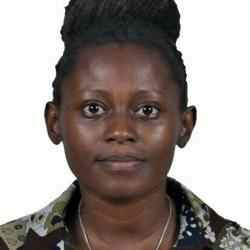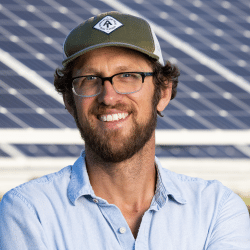Wprowadzenie
Mireia is leading a deep transformation in the food loss and waste system working with farmers, policymakers, civil society organizations, agri-food companies, and schools creating solutions in every link of the food chain extending the life cycle of food.
Nowy pomysł
For the past decade, Mireia Barba has become a leading figure in Europe for managing food waste in the primary sector. Before her involvement, all primary production food loss in Spain was classified as "surplus" and not waste and was kept conceptually separate from food waste from later stages in distribution and consumption. Through her advocacy and research, Mireia and her team have defined, differentiated, and positioned food surplus as food waste on local, national, and European agendas. They have standardized definitions and created quantification manuals in partnership with the European Union to inform policymaking and advocacy efforts. Additionally, Mireia is developing innovative solutions for various stakeholders in the food chain, including farmers, agri-food companies, and schools, fostering a mindset shift among all players.
In 2014, Mireia began working with farmers, addressing the lack of solutions to reduce food loss and waste on farms, where it is estimated that 40% of production is discarded due to reasons like aesthetic standards, overproduction, or market prices. This issue is particularly relevant in Spain, the second-largest EU country in terms of agricultural area, with nearly 25 million hectares of used agricultural land15. Mireia revitalized the ancient practice of gleaning, where volunteers collect and quantify surplus from fields to redistribute it to vulnerable groups through social organizations. This movement has now spread across Catalonia and beyond, involving public administration, social entities, and universities.
The reinvention and formalization of gleaning communities have been crucial in raising awareness about food waste at the primary production level, placing the issue on the public agenda. To further amplify her impact, Mireia championed the Law of Prevention of Food Losses and Food Waste in the Catalan Parliament in 2020. This law was approved and prevents overproduction or surplus food from becoming waste by quantifying it and regulating gleaning movements in the region. Mireia is now working to expand this law to a national level.
In essence, Mireia combines gleaning revival, legislative action, and research-driven solutions to build a transformative movement that promises to reshape the food system and reduce waste, especially in the primary production sector.
Problem
The quality standards for fresh produce in the global North, driven by mercantilist logics, prioritize cosmetic requirements over nutritional or safety characteristics, leading to significant food waste. Food is often not harvested or simply thrown away when market prices fluctuate and many items that do not meet aesthetic standards are discarded. Globally, one-third of food produced for human consumption is wasted throughout the agri-food chain, with estimates suggesting this figure rises to 40% due to food discarded in primary production16. Although there has long been awareness of the issue among environmental groups and farmers, regulatory, economic, and social systems continue to create a feedback loop that obscures this issue from tracking and resolution.
Regulatory and economic systems do not include discards in mandatory quantification and monitoring processes because European law does not recognize unharvested yields as food. This lack of recognition leads to scarce data and awareness at both European and national levels, limiting initiatives to reduce food loss. When Mireia Barba conducted field research in 2014, she found that local farmers did not recognize the thousands of tons of discarded harvests as economic or environmental losses, viewing them as a conventional reality. As regulations invisibilize food loss, there are few economic incentives to shift toward more sustainable production practices.
Thanks to Mireia’s relentless efforts and advocacy for food loss and recovery practices like gleaning have gained recognition in various laws. The recent EU Directive 2018/851/EC on waste, within the circular economy framework, obliges Member States to develop food waste prevention programs and implement measures to reduce post-harvest food losses18. Despite growing acceptance and scaling of laws to national and regional levels, policy and law enforcement remain weak, failing to translate into actionable solutions. Stakeholders in the food production sector are often ill-equipped to quantify and redistribute surplus.
In the food distribution chain, supermarkets, restaurants, and households display perfectly shaped and colored fruits and vegetables. At the household level, insufficient purchase planning, inadequate storage knowledge, and confusion about expiration and best-before dates contribute to food waste. These industry and household practices reinforce a social mindset that values food for convenience and appearance rather than nutritional attributes and sustainable production. Paradoxically, many charities, NGOs, and startups assisting vulnerable groups could benefit from this food.
Despite the issue’s far-reaching consequences, the lack of data, awareness, and incomplete regulation persists. These systemic root causes continue to feed the agri-food sector into an unsustainable and undernourished model.
Strategia
Mireia has devised the following three-pronged strategy to develop sector-specific solutions that involve all stakeholders from the farm to the plate. These solutions aim to transform the status quo and mindsets towards food waste and food loss.
1. Working with farmers and agrifood companies: Leading Change towards Zero Waste in the horticultural sector
Mireia Barba’s strategy to reduce food loss involves empowering union farmers and agricultural cooperatives, through the gleaning movements where they quantify and channel surplus production to those in need through social organizations. By collaborating with the Government of Catalonia, she has created a playbook that enables any organization to establish its own gleaning movement.
Mireia and her team have also designed a digital model to help companies and farmers prevent food losses by developing prevention and reduction plans, where she provides initial training and technology support for eight months. Among the suggestions to extend the lifecycle of food are redistribution to food banks and charitable organizations, innovation in food preservation (pâté, marmalades...) and repurposing for animal feed or composting, all which will be mandatory once the corresponding state regulations are approved. This model facilitates the exchange of surpluses and ensures traceability and reporting to authorities.
Agri-food companies have demonstrated positive reception and innovative implementation of the model given that Sustainability Reporting regulations in Europe are expected in the short term. Examples are varied: reviews of sizing machinery can throw up opportunities to avoid product loss, a thorough client review can result in the negotiation of less stringent aesthetic requirements, and small or outsize fruit and vegetables can be incorporated into client´s shelves and new market opportunities can be identified such as marketing a line of leek soup in big supermarkets using misshapen leeks, with a label identifying them as food surplus from their fields.
After successfully piloting this model in Cataluña, Mireia and her team are now scaling out partnering in different regions of Spain with key stakeholders such as environmental technology centers and the Coordinating Body of Farmers and Ranchers Organizations.
In 2018, Espigoladors, under Mireia’s leadership, established a production center, acting as a laboratory to showcase how discarded food can be transformed into products like jams and pâtés, sold under the "es im-perfect®" brand. Espigoladors either purchase surplus from the farmers and make their own brand, or they offer their production center to producers to make their own products. Im-perfect goods are produced and sold by Mireia’s team, mostly of at-risk women in search of job opportunities, and have reached over 900 stores, generating 25% of Espigoladors’ income. Beyond financial sustainability, these sales serve as tools for awareness and education about the value of aesthetically imperfect produce.
2) Working with policymakers to foster policies to fight food loss.
Mireia’s advocacy efforts, along with the success of the regional Catalan Law in 2020, have sparked a national movement for legislative change with her #ZeroWaste Law proposal. This proposal promotes a transformative approach to addressing food loss and waste, emphasizing prevention and comprehensive quantification.
The proposal is built on a decalogue that tackles this environmental, ethical, and economic challenge. It includes introducing a clear definition of food loss and waste to minimize interpretation and legal violations, making measurement mandatory for all actors along the food chain. It also demands a focus on prevention rather than surplus management and calls for a holistic approach to quantifying losses and waste at all stages of the food chain, while qualitatively identifying the underlying reasons for these losses.
This proposal has been communicated to the public and political groups through an advocacy campaign, aiming to inspire legislative action on a national scale.
3) Building a social movement to change mindsets
Mireia recognizes the importance of public awareness and education in tackling food waste and has built the "I Don’t Waste Movement" to mobilize society to change habits and mindsets. Through gleaning movements, she has provided eye-opening experiences for 15,000 individuals from schools, companies, and vulnerable groups, allowing them to witness firsthand the abundance of perfectly good fruits and vegetables that would otherwise go to waste.
In schools, Mireia’s and team efforts are mobilizing educators, cooks, and students to actively contribute to reducing food waste. She conducts food waste awareness workshops, equipping the entire school community with the tools and knowledge to quantify post-consumption food waste and co-create prevention actions in kitchens. These actions are measured for impact, helping to reduce food waste within their communities. This process has resulted in a playbook designed for schools and catering companies.
Mireia has achieved remarkable impact at a regional, national and European level whilst still leveraging on-the-ground initiatives to create value from surplus resources and provide opportunities for at risk individuals:
• Gleaning Network: Espigoladors has established a robust network comprising 300 farming organizations, 15,000 volunteers, and 100 social entities. Together, they have recovered three million kilograms of fruit and vegetables, translating into nine million food rations distributed. This effort has saved 2,000 tons of CO2 emissions and 1,880 million liters of water.
• Horticulture companies: In just one and a half years of piloting with five companies they have achieved a 10% decrease in food loss within their operations. The success of this pilot coupled with company-level prevention plans becoming mandatory, Mireia’s impact is set to grow exponentially.
• Corporate Engagement: Mireia has initiated a sustainability program with 18 companies, introducing gleaning as a core team-building activity. This not only raises awareness about food waste among employees but also encourages companies to implement food waste protocols, contributing to the broader effort to combat food loss.
• Education and Awareness: Mireia’s and team's educational efforts have reached over 15,000 students, engaging teachers and school staff as ambassadors for food loss and waste prevention. Through more than 2,000 awareness-raising actions, Espigoladors has fostered a strong commitment within school communities. Additionally, 11 leading schools implementing food loss reduction protocols have demonstrated a 34% reduction in food waste, highlighting the effectiveness of Mireia’s guidance and playbook.
Mireia’s approach is rooted in the principle of replication, aiming to spread innovative solutions by partnering with crucial players in the sector, including agricultural unions, universities, technology centers, municipalities, and the European Union. Her research programs are meticulously piloted, tested, and measured, resulting in the creation of research pieces, manuals, protocols, and technologies that can be easily replicated by stakeholders. This emphasis on scalability ensures that the impact of her initiatives extends far beyond their initial implementation.
Overall, Mireia’s inclusive approach ensures that farmers, policymakers, educators, students, and volunteers are all integral parts of the transformation towards a more sustainable and equitable food system.
Osoba
Mireia was raised in Barcelona city, but from childhood, she always felt closely connected to her family’s farming traditions. with a deep appreciation for nature and the value of sustainable practices. As a child, she would spend late summers harvesting fruits with her grandfather and preserving them as jams and jellies, understanding the value of the countryside´s produce, the importance of food as a social and cultural activity, and the comprehension that one product could have multiple lives through pickling and preserving. As Mireia explains, this way of doing things is an art, a culture, a tradition. It’s a way of life that allows you to save money while eating healthily and avoiding food waste. This was her grandparents’ legacy and has been her inspiration.
Mireia had a strong sense of justice from a young age, very aware of societal inequalities and power imbalances. Her desire to address these injustices led her to embark on a journey with the Solidarity Committee to Colombia at eighteen. This journey marked a turning point in her life. From then on, she continued to travel to other developing countries during the summers, immersing herself in different cultures, experiences, and ways of life that allowed her to understand other realities and how people manage challenges in difficult environments.
Mireia’s professional path took her through diverse professional experiences, from financial institutions to social education and community development projects. Each role contributed to her understanding of systemic issues and the power of collective action in effecting change.
In parallel, Mireia’s passion for nature and hiking led her, in her spare time, to create community-driven initiatives focused on connecting people with the outdoors. Through these experiences, she witnessed the transformative power of community and the importance of combating isolation through collective engagement.
Fueled by her desire to create meaningful change, and her vision centered on social and sustainable change, Mireia embarked on a full-time journey of entrepreneurship. Her project was rooted in her farming heritage and driven by a commitment to community empowerment, and thus Espigoladors were born to transform the food system from its core.




